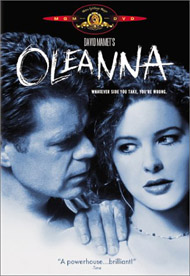| Release List | Reviews | Price Search | Shop | Newsletter | Forum | DVD Giveaways | Blu-Ray/ HD DVD | Advertise |
| Reviews & Columns |
|
Reviews DVD TV on DVD Blu-ray International DVDs Theatrical Reviews by Studio Video Games Features Collector Series DVDs Easter Egg Database Interviews DVD Talk TV DVD Talk Radio Feature Articles Columns Anime Talk DVD Savant HD Talk Horror DVDs Silent DVD
|
DVD Talk Forum |
|
|
| Resources |
|
DVD Price Search Customer Service #'s RCE Info Links |
|
Columns
|
 |
Savant Guest Review:
Oleanna
|
||||
Misunderstood or malicious? Predator or prey? In Oleanna, David Mamet's 1994 film adaptation of his own play, an awkward relationship between college professor and student reaches a blistering, unexpected climax. Mamet's dialogue is as sharp as always and the performances - especially by Mamet favorite William H. Macy - are solid, and it is enough to carry the "filmed play."
It's not until the third act that Mamet, through Eisenstadt's Carol, lets his mission statement slip. "I'm not interested in your feelings or your motivations," she says, "but your actions." That one line sums up much of Mamet's philosophy towards theatre and film; as a playwright he crafts characters who don't worry about what they are feeling, but just what they do. Shelley Levene doesn't care that he's miserable in Glengarry Glen Ross, he just wants to find a way to keep his job. Joseph Turner White wants to hold onto his integrity in State and Main; he can't be concerned with how he feels about the movie industry. Indeed, Oleanna is based on a conflict over that very premise. The plot of the entire film is centered on a "misunderstanding" between Macy and Eisenstadt. Macy is always looking for "why": Why isn't Carol succeeding in the classroom? Why does she go to the tenure board? Why does she seek out the help of an unidentified "group" to back her up? Eisenstadt, meanwhile, cares nothing about what Macy feels or what he meant, but what happened. Eisenstadt does well with Carol, a role originally played by Rebecca Pidgeon (Mamet's wife) in the stage version. It would very easy to come off as shrill, especially in the second and third acts, but even when Carol is at her least rational and most manipulative, Eisenstadt manages to inject some humanity. Macy is fantastic as John, the college professor. He and Mamet have a lengthy history, as co-founders of the Atlantic Theatre Company and the style of acting they call "practical aesthetic." The aesthetic viewpoint on acting is simple in theory. All scenes can be broken down for the actor into three questions: What is the literal action in the scene? What is the character doing? What is it like in my own life? There is no playing emotion and no asking of what the character is feeling. What the character is feeling is whatever the actor is feeling on stage. While it may sound like common sense, the aesthetic is a dividing subject among many actors. In Mamet's book True and False: Heresy and Common Sense for the Actor, he writes, "The 'work' you do 'on the script' will make no difference. ... That work has already been done by a person with a different job title than yours. That person is the author." Obviously, a playwright telling actors to stay away from interpreting the script is going to lead to a clash of egos. Those trained in the Stanislavsky, or "method" style of acting could get heart palpitations by reading that sentence: "How are we supposed to find the character? Where will our emotional connection come from?" Interestingly enough, True and False also gives Mamet's take on Macy's character in Oleanna. "The classroom will teach you how to obey," he writes, "and obedience in the theater will get you nowhere." Macy's teacher character is sympathetic to the idea that education is not a substitution for thinking, and it is that idea that Eisenstadt can't get her head around; she is not a good student, in her mind, because she does not know the answers. Oleanna works brilliantly on stage, but on film the story loses some of its immediacy. There is an odd claustrophobia in a movie where 80 minutes or so take place in a single office, and the entire script is a conversation. The film is shot like a staged play in many ways, especially the framing; Eisenstadt and Macy move in and out of frame often, with the camera rarely moving. The MGM DVD release of Oleanna is disappointingly bare. The trailer is the only extra on the disc, with a mono Spanish track and English, Spanish and French subtitles available. Considering the film grossed less than $125,000 at the box office (according to the IMDB), no one would have expected a two-disc special edition, but the evidence of some sort of involvement by Mamet or Macy would have been nice. The transfer itself is clean, and the audio is all it needs to be for a production that is two characters talking for 90 minutes.
On a scale of Excellent, Good, Fair, and Poor,
Oleanna rates:
Review Staff | About DVD Talk | Newsletter Subscribe | Join DVD Talk Forum |
|
| Release List | Reviews | Price Search | Shop | SUBSCRIBE | Forum | DVD Giveaways | Blu-Ray/ HD DVD | Advertise |






